多维教程通达unit12课文原文
多维阅读第12级—Circus Performers 马戏团演员的诞生

Read pages 2-3 and answer the questions.
1. Who do you think these people might be? 2. What are they doing?
3. Have you ever seen circus performers? 4. How do you think circuses have changed?
5. Why do you think a person needs to be strong to do circus tricks?
Read pages 8-9 and answer the questions.
1. What do you think would be difficult about these tricks?
In the acts of balancing and spinning plates, and tightrope walking, performers are always ______________ things. It is very important.
In the acts of flying trapeze, juggling, ________________is important.
阅读另一篇关于马戏团演员或其他靠危险技能来娱乐人们的演员的书籍或故事并给大家讲一讲
Look at the cover of the book.
1. What can you see from the cover? 2. Do you like watching circus performances?
Read pages 4-7 and answer the questions.
研究生英语系列教程多维教程熟谙正文翻译及课后练习参考答案
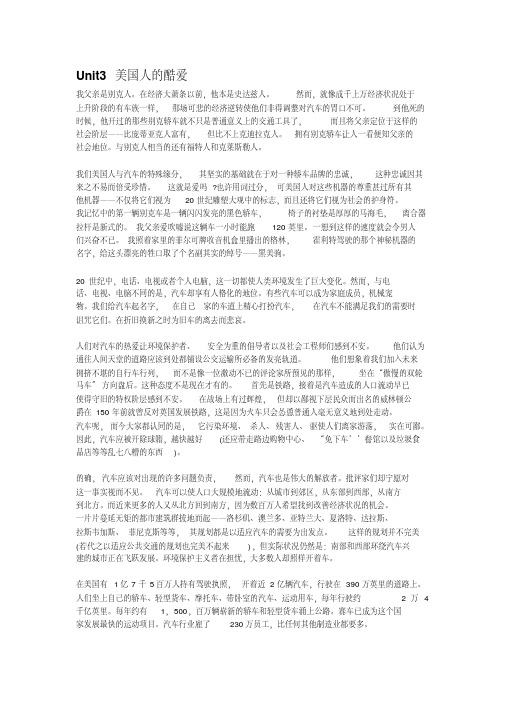
Unit3 美国人的酷爱我父亲是别克人。
在经济大萧条以前,他本是史达兹人。
然而,就像成千上万经济状况处于上升阶段的有车族一样,那场可悲的经济逆转使他们非得调整对汽车的胃口不可。
到他死的时候,他开过的那些别克轿车就不只是普通意义上的交通工具了,而且将父亲定位于这样的社会阶层——比庞蒂亚克人富有,但比不上克迪拉克人。
拥有别克轿车让人一看便知父亲的社会地位。
与别克人相当的还有福特人和克莱斯勒人。
我们美国人与汽车的特殊缘分,其坚实的基础就在于对一种轿车品牌的忠诚,这种忠诚因其来之不易而倍受珍惜。
·这就是爱吗?也许用词过分,可美国人对这些机器的尊重甚过所有其他机器——不仅将它们视为20世纪雕塑大观中的标志,而且还将它们视为社会的护身符。
我记忆中的第一辆别克车是一辆闪闪发亮的黑色轿车,椅子的衬垫是厚厚的马海毛,离合器拉杆是新式的。
我父亲爱吹嘘说这辆车一小时能跑120英里。
一想到这样的速度就会令男人们兴奋不已。
我照着家里的菲尔可牌收音机盒里播出的格林,霍利特驾驶的那个神秘机器的名字,给这头漂亮的牲口取了个名副其实的绰号——黑美驹。
20世纪中,电话、电视或者个人电脑,这一切都使人类环境发生了巨大变化。
然而,与电话、电视、电脑不同的是,汽车却享有人格化的地位。
有些汽车可以成为家庭成员,机械宠物。
我们给汽车起名字,在自己·家的车道上精心打扮汽车,在汽车不能满足我们的需要时诅咒它们。
在折旧换新之时为旧车的离去而悲哀。
人们对汽车的热爱让环境保护者、安全为重的倡导者以及社会工程师们感到不安。
他们认为通往人间天堂的道路应该到处都铺设公交运输所必备的发亮轨道。
他们想象着我们加入未来拥挤不堪的自行车行列,而不是像一位激动不已的评论家所预见的那样,坐在“傲慢的双轮马车”方向盘后。
这种态度不是现在才有的。
首先是铁路,接着是汽车造成的人口流动早已使得守旧的特权阶层感到不安。
在战场上有过辉煌,但却以鄙视下层民众而出名的威林顿公爵在150年前就曾反对英国发展铁路,这是因为火车只会怂恿普通人毫无意义地到处走动。
Unit12(完整版)

Unit12(完整版)Unit 12 Christmas Day in the Morning(Key to Exercises)Preview1. Listen to the recording of the text and decide whether the statements are true (T) or false (F).1.F 2.F 3.T 4.T 5.T 6.T7.T 8.F 9.T 10.F 11.T Vocabulary1. Become familiar with the rules of word formation.1 Complete the sentences by translating the Chinese in the brackets.1.alike 5.aside2.alive 6.ahead3.ashamed 7.asleep,wide awake4.ashore 8.aboard the ship,abroad2 Translate the following compound nouns into Chinese.1.药店8.水彩画2.马力9.宇宙飞船;太空船3.机场10.商标4.轮椅11.油气管道;新闻标题5.太阳眼镜12.救生船6.月光13.脚注7.手提包14.海藻;海草;海带3 Translate the following into Chinese.1.政治(学) 7.语言学2.经济学8.语音学3.物理学9.遗传学4.数学10.电子学5.统计学11.力学;机械学6.伦理学4 Fill in the blanks with the correct form of the word in the brackets.1.simplified 6.1egaiized,justified,civilized2.authorized,organize 7.intensify, unification3.normalized 8.nationalized4.industrialized,urbanized 9.notified, computerized5.modernization, classified 10.globalization,,idealized,2. Translate the following expressions into Chinese.1.进(出)房间2.走进(出)房间3.赶快走进(出)房间4.冲进(出)房间5.偷偷溜进(出)房间,6.曲折行进穿过人群7.踮着脚尖走/跌跌撞撞地走/摇摇晃晃地走/悄悄地走/爬进(出)房间8.冲进(出)房间9.优雅地、跳跃着进(出)房间10.费力地走出树林’11.在黑暗中摸着路前进12.鞠躬下台’‘1 3.用手推开人群/用肩膀拱开人群/用胳膊肘挤开人群14.一寸一寸地慢慢向顶部挪去15.一路要饭到长城(孟姜女万里寻夫的故事)16.杀出重围回到自己的队伍3. Complete the following sentences.1.a) success/luckb) I had more timec) I were ten years younger2.a) everybody is hereb) are college studentsc) w e have become one of the world’s largest economies3.a) we put environmental protection before GDPb) gave more attention to critical thinking.4.a) the grammar exercisesb) helping you withc) help us with5.a) what the book says is always correctb) take it for grantedc) take it for granted6.a) sayb) plan my timec) kiss/thank,criticize7.a) like fishb) did goc) did smoke4. Rewrite the following sentences,replacing the parts in bold type with words and expressions from the text.1.Strange2.to be bursting with3.the habit of… clung to him still,slipping into,check4.can’t take any thing for granted,take it for granted that we will be able5.Come to think of it6.But come to think of it/But now that I think about it7.Now that people all seem to have more money than before,I do hate,nowadays8.manage to (dig),Come to think of it,9.but now that I am,will slip back easily in time5. Fill in the blanks with the correct prepositions or adverbs.1.in,in 5.Unlike,for2.of, of, instead of 6.in,off, off, of/about/with3.with,to,as 7.as,to,up4.to,as 8.in,with6. Translate the following sentences into English.1. How do you manage to keep so fit? Come to think of it,I have never known you to besick.What’s your secret?2. I always hated to do household chores when I was a boy, taking it for granted that theywere only for women.Looking back,I really feel sorry for my past attitude.3. His big house contains two separate buildings designed in different styles and connectedwith/by a secret passage.4. Young people always wish they had more power and money, whereas old people alwayswish they were thirty years younger.Then they would all become the happiest people on earth.As for me,I am happy unconditionally..5. The other day I overheard some foreigners talking about how some of our people behavedwhile they were traveling overseas.They made me so ashamed.I think we really have to change some of our bad habits.6.Now that our public transportation system has improved so much,private cars are really not worth buying.7.Nowadays you seldom see young people loitering in the streets.People always seem to be in a hurry.Sometimes I dohope we can slow down a little bit.7. Fill in the blanks with the Correct form of the words given below.1.worth 14.wild herbs to eat2.worthwhile 15.grass3.worthy 16.weeds4.worth 17.received, accepted5.now/nowadays 18.will accept6.now 19.received7.nowadays 20.lovely, beloved/loving8.look 21.beloved9.gaze 22.loving10.staring 23.cry/weep11.glanced 24.crying12.glanced 25.sobbing13.hayGrammar1. Classify the use of it in these sentences into the following groups.Group 1:3.referring to “his father loved him'” in the previous sentence4.referring to “all the milking” in the previous sentence 5.referring to“a quarter to three”in the opening sentence of the paragraph6.referring to“Milking”,the first word in the sentenceGroup 2:1.referring to timeGroup 3:2.to introduce the subject which is omitted but understood8.to introduce the subject “that it was alive…”9.to introduce the subject:“how the habits of his youthcling to him still”Group 4:7.in set phrase“come to think of it'’10.in set phrase“when it comes to…”2. Complete the sentences using,the proper conjunction from the box below. Some words can be used more than once 1.as if/though 2.before 3.as long as 4.even though / if 5.Even if /though6.now that 7.as long as 8.as if/though 9.Even though/ if10.Now that3. Translate the following sentences into English.1.I love autumn—it’s a season of harvest.2.I didn’t recognize my best friend at high school until he removed his sun glasses.3.It takes courage to ask what others regard as“stupid”questions.4.The children looked as if they hadn’t had a wink of/any sleep last night.5.It must be exciting to report on/cover such sports events as the Olympic Games and the World Cup.6.My house guest behaves as if she were the owner of the house.7.Even if the country is gradually recovering from the financial crisis,it may be some time before its economy gets back on its feet.8.“As long as I’m in charge,’’said the president of the university,“1 will make sure no one drops out because they can’t pay tuition any more.’’9.Now that they have a new Minister of Education,they hope to see some change in their education system.10.It was a brilliant/sunny summer morning in 1945.At exactly 8:15.a B一29 bomber dropped an atomic bomb on the Japanese city of Hiroshima,killing tens of thousands of people.4. Fill in each blank of the passage with ONE suitable word.(1)smoke 2)what (3)teach (4)control (5)complaints(6)group (7)at (8)could (9)shared (10)more5. Identify and correct the mistake(s)in each of the sentences.1.At about three o’clock,the boy went to the barn and did the milking all by himself.2.Up until now there are still people who cling to the idea that men are superior to women.3.I think I locked the doors and closed the windows,but I’ll just go and make sure of them.(or:…make sure I did.)4. It suddenly occurred to me that I had left my bike key in the classroom.5. Every one of us must arrive before 8 pm without exception.6. It’s important for young people to learn how to survive in the wild.7. It’s time our school upgraded its computer program.8. Robert woke up twenty times for fear that he would oversleep.9. Upon graduation,he was bursting with gratitude for the university where he had received a first-class education.10. The teacher could hardly believe a student growing up ina mountain village had neverseen a computer before he came to college.。
综合英语教程(第三版)BOOK2-课文译文 12.第十二单元
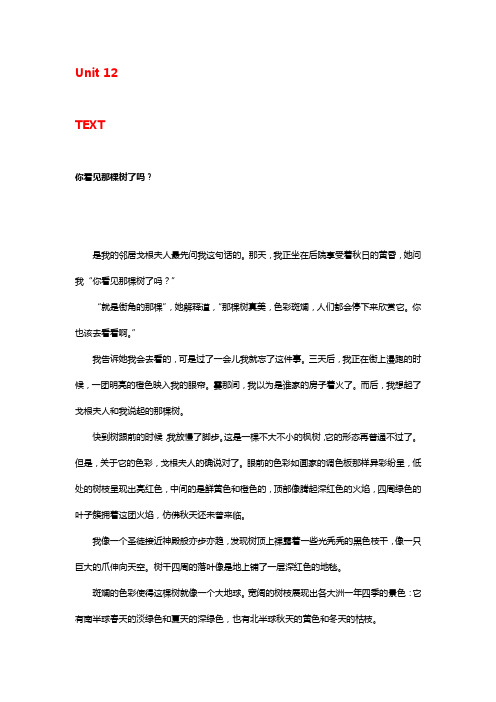
Unit 12TEXT你看见那棵树了吗?是我的邻居戈根夫人最先问我这句话的。
那天,我正坐在后院享受着秋日的黄昏,她问我“你看见那棵树了吗?”“就是街角的那棵”,她解释道,“那棵树真美,色彩斑斓,人们都会停下来欣赏它。
你也该去看看啊。
”我告诉她我会去看的,可是过了一会儿我就忘了这件事。
三天后,我正在街上漫跑的时候,一团明亮的橙色映入我的眼帘。
霎那间,我以为是谁家的房子着火了。
而后,我想起了戈根夫人和我说起的那棵树。
快到树跟前的时候,我放慢了脚步。
这是一棵不大不小的枫树,它的形态再普通不过了。
但是,关于它的色彩,戈根夫人的确说对了。
眼前的色彩如画家的调色板那样异彩纷呈,低处的树枝呈现出亮红色,中间的是鲜黄色和橙色的,顶部像腾起深红色的火焰,四周绿色的叶子簇拥着这团火焰,仿佛秋天还未曾来临。
我像一个圣徒接近神殿般亦步亦趋,发现树顶上裸露着一些光秃秃的黑色枝干,像一只巨大的爪伸向天空。
树干四周的落叶像是地上铺了一层深红色的地毯。
斑斓的色彩使得这棵树就像一个大地球。
宽阔的树枝展现出各大洲一年四季的景色:它有南半球春天的淡绿色和夏天的深绿色,也有北半球秋天的黄色和冬天的枯枝。
在我惊叹这包罗万象的美景的时候,我想起了拉尔夫·瓦尔多·爱默生关于星辰的注解。
他曾经在《自然》中说到,假如天上璀璨的星辰一千年只出现一次,那么看到它们是件多么激动人心的事情啊!但是,就是因为它们每天都会出现,所以我们难得会想起抬头望它们一眼。
因此对这棵树,我也有同样的感受。
它只有一周的灿烂辉煌,所以这短暂的美景对我们来说尤为珍贵,而我竟差点儿错过。
19世纪,有人曾在马萨诸塞州的上空看到绚丽多彩的北极光时,他敲响了教堂的钟,把全镇的居民都叫醒。
这就如同我对那棵树,我也想唤醒大家来欣赏这棵树神奇而短暂的美。
虽然我没有教堂的钟,但在回家的路上,我问了每位邻居一个简单而重要的问题,就是戈根夫人曾经问我的那句“你看见那棵树了吗?”(弋睿仙译)Read more树叶的神奇11本篇译文摘自百度文库/view/d9587024bcd126fff7050bd8.html每当我在秋风中散步的时候,便不由地想起树叶的微妙和神奇。
研究生英语多维教程课文翻译及课后答案精编版
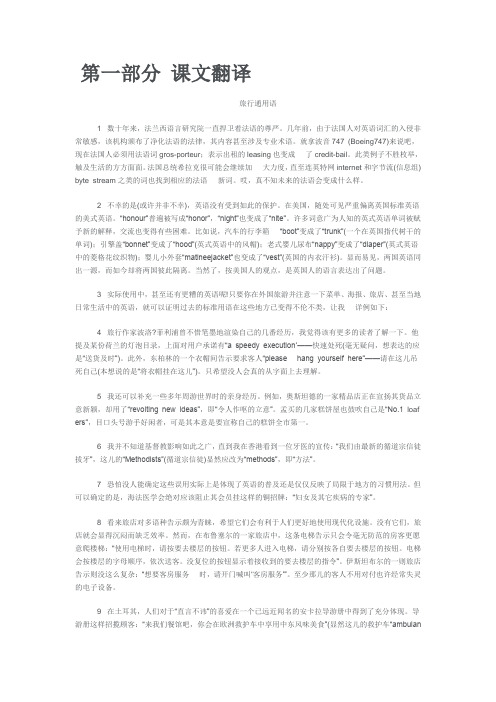
第一部分课文翻译旅行通用语1 数十年来,法兰西语言研究院一直捍卫着法语的尊严。
几年前,由于法国人对英语词汇的入侵非常敏感,该机构颁布了净化法语的法律,其内容甚至涉及专业术语。
就拿波音747 (Boeing747)来说吧,现在法国人必须用法语词gros-porteur;表示出租的leasing也变成了credit-bail。
此类例子不胜枚举,触及生活的方方面面。
法国总统希拉克很可能会继续加大力度,直至连英特网internet和字节流(信息组) byte stream之类的词也找到相应的法语新词。
哎,真不知未来的法语会变成什么样。
2 不幸的是(或许并非不幸),英语没有受到如此的保护。
在美国,随处可见严重偏离英国标准英语的美式英语。
“honour”普遍被写成“honor”,“night”也变成了“nite”。
许多词意广为人知的英式英语单词被赋予新的解释,交流也变得有些困难。
比如说,汽车的行李箱“boot”变成了“trunk”(一个在英国指代树干的单词);引擎盖“bonnet”变成了“hood”(英式英语中的风帽);老式婴儿尿布“nappy”变成了“diaper”(英式英语中的菱格花纹织物);婴儿小外套“matineejacket”也变成了“vest”(英国的内衣汗衫)。
显而易见,两国英语同出一源,而如今却将两国彼此隔离。
当然了,按美国人的观点,是英国人的语言表达出了问题。
3 实际使用中,甚至还有更糟的英语呢!只要你在外国旅游并注意一下菜单、海报、旅店、甚至当地日常生活中的英语,就可以证明过去的标准用语在这些地方已变得不伦不类,让我详例如下:4 旅行作家波洛?菲利浦曾不惜笔墨地渲染自己的几番经历,我觉得该有更多的读者了解一下。
他提及某份荷兰的灯泡目录,上面对用户承诺有“a speedy execution‟——快速处死(毫无疑问,想表达的应是“送货及时”)。
此外,东柏林的一个衣帽间告示要求客人“please hang yourself here”——请在这儿吊死自己(本想说的是“将衣帽挂在这儿”)。
研究生英语 多维教程 翻译Uint6-12双语版

Unit 6A. 正如诗人埃德蒙.斯宾塞在将近四百年前所说的那样,大自然是“最伟大的女神”。
她似乎担任了上帝驻地球的总督的职务。
斯宾塞把她描写成一位母亲和法官。
她管辖着所有的生物之间的往来,并不分厚薄地给予他们权利,因为她是一位公正的母亲。
她把他们紧密地联结在一起,就象兄弟姐妹。
因而,在斯宾塞看来,生物繁殖及生物秩序的自然规律与公正原则显而易见地是联系在一起的。
当我们得知斯宾塞认为大自然也具有公正原则的时候我们或许有点吃惊。
然而,斯宾塞不仅以人类的手足之情而是以所有生物的手足之情为依据来坚持自然界有这么一位“公正的”法官。
要是在当今,我们会说斯宾塞是以生态学作为其可靠依据的。
B. 如果我们人类和大自然的固有关系不是相互对抗的,那么,它又是什么样的一种关系呢?对我们来讲,这个变得相当复杂难解,因为正如我先前所讲过的那样,我们中没有人想在未经开发的原始森林里或在未经改造的原始大草原上生活,我们不想被大灰熊吃掉。
假如我们是园艺家,我们有正当的理由去抱怨园内的杂草。
在肯塔基州,如果我们准备改良牧场,我们就很可能成为那一片随风摆动的大蓟的敌人。
但是,如果我们还随心所欲,想做什么就做什么,那么,我们就会对那些曾经被我们砍伐破坏了的原始森林和草原着迷,我们会一而再而三地想起它们,想起那些幸存的原始森林和原始草原。
我们还会感到大灰熊深深地吸引着我们。
我们知道,在整个人类时期我们会一直想起大灰熊及其他一些危险动物。
1.大多数自然保护主义者认为,在良好的生态环境中人类最易兴旺发达,而各种野生动物的生存则是这种良好生态环境的标志。
1. Most conservationists believe that humans thrive best in ecological health and that the sign of this health is the survival of a diversity of wild animals.2.史密史先生出示了大量证据来表明:在某种程度上,如果我们破坏大自然,那就是毁灭我们。
Unit-12-“Take-Over--Bos’n!”课文翻译综合教程三

Unit 12“Take Over, Bos’n!〞Oscar Schisgall1 Hour after hour I kept the gun pointed at the other nine men. From the lifeboat’s stern, where I’d sat most of the twenty days of our drifting, I could keep them all covered. If I had to shoot at such close qu arters, I wouldn’t miss. They realized that. Nobody jumped at me. But in the way they all glared I could see how they’d come to hate my guts.2 Especially Barrett, who’d been bos’n’s mate; Barrett said in his harsh, cracked voice, “You’re a fool, Snyder. Y-you can’t hold out forever! You’re half asleep now!〞3 I didn’t answer. He was right. How long can a man stay awake? I hadn’t dared to shut my eyes in maybe seventy-two hours. Very soon now I’d doze off, and the instant that happened they’d jump on the li ttle water that was left.4 The last canteen lay under my legs. There wasn’t much in it after twenty days. Maybea pint. Enough to give each of them a few drops. Yet I could see in their bloodshot eyes that they’d gladly kill me for those few drops. As a man I didn’t count any more. I was no longer third officer4 of the wrecked Montala. I was just a gun that kept them away from the water they craved. And with their tongue swollen and their cheeks sunken, they were half crazy.5 The way I judged it, we must be some two hundred miles east of Ascension. Now that the storms were over, the Atlantic swells were long and easy, and the morning sun was hot –so hot it scorched your skin. My own tongue was thick enough to clog my throat. I’d have given the rest of my life for a single gulp of water.6 But I was the man with the gun — the only authority in the boat — and I knew this: once the water was gone we’d have nothing to look forward to but death. As long as we could look forward to getting a drink later, there was something to live for. We had to make it last as long as possible. If I’d given in to the curses, we’d have emptied the last canteen days ago. By now we’d all be dead.7 The men weren’t pulling on the oars. They’d stopped that long ago, too weak to go o n. The nine of them facing me were a pack of bearded, ragged, half-naked animals, and Iprobably looked as bad as the rest. Some sprawled over the gunwales, dozing. The rest watched me as Barrett did, ready to spring the instant I relaxed.8 When they were n’t looking at my face they looked at the canteen under my legs.9 Jeff Barrett was the nearest one. A constant threat. The bos’n’s mate was a heavy man, bald, with a scarred and brutal face. He’d been in a hundred fights, and they’d left their marks on him.10 Barrett had been able to sleep —in fact, he’d slept through most of the night – and I envied him that. His eyes wouldn’t close. They kept watching me, narrow and dangerous.11 Every now and then he taunted me in that hoarse, broken voice:12 “Why don’t you quit? You can’t hold out!〞13 “Tonight,〞I said. “We’ll ration the rest of the water tonight.〞14 “By tonight some of us’ll be dead! We want it now!〞15 “Tonight ,〞I said.16 Couldn’t he understand that if we waited until night the few drops wouldn’t be sweated out of us so fast? But Barrett was beyond all reasoning. His mind had already cracked with thirst. I saw him begin to rise, a calculating look in his eyes. I aimed the gun at his chest – and he sat down again.17 I’d grabbed my Luger on inst inct, twenty days ago, just before running for the lifeboat. Nothing else would have kept Barrett and the rest away from the water.18 These fools —couldn’t they see I wanted a drink as badly as any of them? But I was in command here — that was the difference. I was the man with the gun, the man who had to think. Each of the others could afford to think only of himself; I had to think of them all.19 Barrett’s eyes kept watching me, waiting. I hated him. I hated him all the more because he’d slept. He had that advantage now. He wouldn’t keel over.20 And long before noon I knew I couldn’t fight any more. My eyelids were too heavy to lift. As the boat rose and fell on the long swells, I could feel sleep creeping over me like paralysis. I bent my head. It fil led my brain like a cloud. I was going, going …21 Barrett stood over me, and I couldn’t even lift the gun. In a vague way I could guess what would happen. He’d grab the water first and take his drop. By that time the others would be screaming and tearing at him, and he’d have to yield the canteen. Well, there was nothing more I could do about it.22 I whispered, “Take over, bos’n.〞23 Then I fell face down in the bottom of the boat. I was asleep before I stopped moving…24 When a hand shook my shoulder, I could hardly raise my head. Jeff Barrett’s hoarse voice said, “Here! Take your share o’ the water!〞25 Somehow I propped myself up on my arms, dizzy and weak. I looked at the men, andI thought my eyes were going. Their figures were dim, shadowy; but then I realized it wasn’t because of my eyes. It was night. The sea was black; there were stars overhead, I’d slept the day away.26 So we were in our twenty-first night adrift —the night in which the tramp Croton finally picked us up – but now, as I turned my head to Barrett there was no sign of any ship. He knelt beside me, holding out the canteen, his other hand with gun steady on the men.27 I stared at the canteen as if it were a mirage. Hadn’t they finished that pint of water this morning? When I looked u p at Barrett’s ugly face, it was grim. He must have guessed my thoughts.28 “You said, ‘Take over, bos’n,’ didn’t you?〞he growled. “I’ve been holding off these apes all day.〞He hefted the Luger in his hand. “When you’re boss-man,〞he added, “in command and responsible for the rest — you —you sure get to see things different, don’t you?〞“水手长,接手吧!〞奥斯卡·希斯高尔1. 一小时又一小时,我用枪指着其他九个人。
多维课文译文

多维教程Unit2 家族企业:下一代1 美国正处于人类历史上最重大的财富交接时期之一,在未来的20年中,大约有15兆美元的资产将从这一代人的手中转到下一代人的名下。
2 其申大部分财富以家族企业的形式进行交接,但是许多企业交接后的生存能力值得怀疑,事实上绝大部分将倒闭。
通常只有三分之一的企业能成功地转交到第二代人手中,家族企业能在第三代人手中幸存下来的现象比较罕见。
3 成千上万的家族企业,包括一些家喻户晓的企业,将在未来十年中消失。
令人悲哀的是,如果规划适当的话,许多企业本应能够幸存下来,然而,对于许多企亚来说,也许为时已晚。
开始筹划家族企业承接需要充分时间,不是一年、三年,甚至五年都不够。
确实,要完善地构造一项全面的承接计划,包括复杂的不动产规划策略,大概需要至少十年的时间。
4每一个家族企业,无论其规模大小,技术含量高低,众所周知的还是默默无闻的,都有与众不同的特点。
但是,尽管情况千差万别,一个业要想能够进行成功交接的话必须具备下列四项要素。
计划承接管理5(家族企业的)所有人或创建者具有极其强烈的紧迫感并且精力充沛,他们常常不仅在某一项技术上出类拔萃。
在许多情况下,生产专家同时还是营销天才或资深金融家,代替他们可能需要不止一个人,因此,家庭业主应通过创建编制图表来精确地决定企业将如何运作。
承接队伍中的每一位核心成员均应创建自己的蓝图,然后进行对比,其不同之处将表明管理结构中的差异并突出显示误解所在与认识上的不同。
6 以朱迪为例,朱迪拥有一个软件公司,并有三个孩子蜓―个是电脑奇才,一个是鮮手,一个虽然拿到了工商管理学位却对公司不感兴趣。
另外,朱迪还有一个强大的管理团队,根据她的情况,她应该考虑把所有权交给孩子,让其管理团队继续经营企业。
7 无论从家庭成员内或家庭成员外寻找合造的人选来填充这些职位都不是件容易的事,更不是一蹴而就的事。
因而,关键是在承接过程中要尽早硏制行动计划以及时间表,以便有条不紊行职责交接。
多维教程探索2、3、4、12单元汉译英

多维教程探索2、3、4、12单元汉译英Unit 1 Lies and Truth1、关于说谎是否总是坏的,是否应该避免,不同的人有不同的看法。
(avoid)Different people have different opinions about whether lying is always bad and whether is should be avoided. 2、伦敦最高的大楼同纽约的摩天大楼比较起来,仍算是小的。
(in comparison with)The tallest buildings in London are small in comparison with the skyscrapers of New York .3、在可接受的谎言与恶意的谎言之间定界是因人而异,因文化而异的。
(draw a/ the line between)The point at which people draw the line between an acceptable lie and a bad lie varies from individual to individual and from culture to culture.4、溺爱孩子的母亲常常会对自己孩子的过错睁一只眼闭一只眼。
(turn a/ one’s blind eye)Mothers who spoil their children often turn a blind eye to the faults of their children.5、当暴力行为发生的时候,这个国家需要一个能使人民团结一致的领袖。
(hold…together)The country need a leader who will hold the nation together when violence breaks out.6、自私者将所有的人分成两类:他喜欢的人和他不喜欢的人。
研究生多维教程通达课文解释及课后答案unit1-unit3

博士英语多维教程通达课文解释及课后答案!Unit 1 What Will BeBackground InformationLanguage PointsKey to Exercises1.We’ve now acknowledged some fundamental ancient human forces and the ways they will affect and be affected by the Information Marketplace. And throughout the course of this book we’ve answered the questions we raised at the very beginning. So it is time to finally consider the greatest transformation that the Information Marketplace ha to offer. To get to it, let’s reconstruct the growing crescendo of key discoveries we have made, which together describe “what will be.”2.We began with a simple but far-reaching model of the future world of information as an Information Marketplace, where people and their computers will buy, sell, and freely exchange information. Our first discovery was that this Information Marketplace can indeed be built on a technological foundation: the information infrastructure. We went on to explore the many human-machine interfaces people will use to get in and out of this new edifice, from virtual reality and fancy bodysuits to the lowly keyboard, and singled out speech interfaces as perhaps the most significant and imminent. We explored the pipes that will carry our information and the ways we will bend them to give us the speed, reliability, and security we need. We also saw how a vast array of new shared software tools will evolve on this infrastructure, shifting the attention of the entire software business from individual to interconnected computers. The arrival of this foundation is certain, but it could be delayed by a decade or more if the key players continue their wars for control and their indifference toward the shared infrastructure they all need. We saw too that there won’t be just a handful of winners that will survive t hese wars; the terrain is vast, rich, and full of challenges for almost every supplier and consumer of information to be a winner.3.Our second major discovery was that the Information Marketplace will dramaticallyaffect people and organizations on a wide scale. Besides its many uses in commerce, office work, and manufacturing it will also improve health care, provide new ways to shop, enable professional and social encounters across the globe and generally permeate the thousands of thins we do in the course of our daily lives. It will help us pursue old and new pleasures, and it will encourage new art forms, which may be criticized but will move art forward, as new tools have always done. It will also improve education and training first in specific and established ways and later through breakthroughs that are confidently awaited. Human organizations from tiny companies to entire national governments will benefit too, because so much of the work they do is information work.4.Putting all these detailed uses in perspective, we came to realize that they are different faces of two major new forces: electronic bulldozers and electronic proximity. Each has broad consequences for society. The electronic bulldozers’ effect is primarily economic, increasing human productivity in both our personal lives and the workplace. The rapid, widespread distribution of information in the form of info-nouns (text, photos, sounds, video) and especially info-verbs (human and machine work on information) is one simple way in which productivity will increase. Automatization is the other powerful effector; machine-to-machine exchanges will off-loaded human brain work the way machines of the Industrial Revolution off-loaded muscle work. We concluded, however, that to enjoy the productivity benefits we will have to avoid and correct certain technological and human pitfalls.5.To better understand the economic impact of the Information Marketplace, we explored the value of information and its consequences. This led us to a few troublesome discoveries: the huge amount of info-junk we’ll have to work hard to avoid and the gap between rich and poor nations (and people) that will increase if we do nothing to stop it. Other economic consequences were less clear, like the unemployment rate ov er the long run, which we can’t fore cast even though we can foresee many new types of jobs.6.Another important discovery from these explorations was the power of the Information Marketplace to customize information and information work to different huma n and organizational needs. To leverage this power, we’ll need to make our machines considerably easier to use that they are today. With increased productivityand customization, we can look forward to a larger array of better, cheaper. More customized products and services that will reach us even faster than before. More important, by making machines easier to use and giving ourselves the ability to fashion software painlessly and rapidly, we can fulfill the promise of the Information Age to tailor the new technologies to our individual human and organizational purposes, rather than the other way around.7.The second of the two major forces --- electronic proximity --- will increase bya thousand times the number of people we can easily reach and will bring people together across space and time. Many social consequences, good and bad, will arise as this new proximity distributes powers of control from central authorities to the many hands of the world’s people. Groupwork and telework will further help impro ve human productivity. Democracy will spread, as will people’s knowledge of one another’s beliefs, wishes, and problems. The voiceless millions of the world will come to be heard and be better understood, provided that the wealthy nations help the less wealthy ones enter the Information Club. Ethnic groups may become more cohesive, as people belonging to a certain tribe use the Information Marketplace to bind themselves together regardless of where they may be. At the same time. The Information Marketplace will help shared cultures grow in nations that thrive on diversity.And though we need not change our legal framework in any major way to accommodate the Information Marketplace, different nations will need to cooperate on shared conventions for security, billing, and other transnational issues that will surely arise as shared information crosses international barriers. On another level, electronic proximity will foster a shared universal culture, a thin veneer on top of all the world’s individual national cultures. We hope that this ecumenical property of the Information Marketplace to enhance the co-existence of nationalistic identity and international community will help us understand one another and stay peaceful.8.Our exploration then brought us squarely before human emotions and human relationships. We discovered that they will pass only partially through eh Information Marketplace. Physical proximity will still be necessary to consummate these emotions and recharge the batteries that will sustain human relationships between virtual encounters. Finally, we discovered that the primitive forces of the cave that lie at the roots of our emotions and passions do not pass through theInformation Marketplace; deep down, our psyches know that 1s and 0s cannot love, nurture, hurt, or kill us at a distance. Because many of our most valued actions and decisions involve these forces like trust, love, and fear --- the information world will not be a substitute for the physical world.9.Given all these possibilities for change, we considered what might happen when they bump up against the ancient human beings that we are and have been for thousands of years. Predictably, we discovered that we will have difficulty coping with the increased social and technological complexity and overload brought forth by the Information Marketplace. Though we will be potentially close to hundreds of millions of people, we will be able to deal with only a very few of them at any given time. Yet we saw that we might be able to reduce some of these complexity problems by making the artifacts of the Information Age easier to use --- a primary goal for the technologists of the twenty-first century.10.The Information Marketplace will make of us urban villagers --- half urban sophisticate, roaming the virtual globe, and half villager, spending more time at home and tending to family, friends, and the routines of the neighborhood. If our psyches tilt toward the crowded urban info-city, we will become more jaded, more oriented toward the self, and more indifferent, fickle, and casual in our relationships with others, as well as less tightly connected to our families and friends. If we tilt toward the village, we may be surprised by a resurgence of more closely knit families rooted in our tighter human bonds. Indeed, if we use it correctly, the Information Marketplace can be a powerful magniying lens that can amplify goodness --- employing disabled and home-bound workers, matching help needed with help offered via the Virtual Compassion Corps, and helping people learn and stay healthy, among many other possibilities.11.Reflecting on our exploration, we also discovered that people will exploit the newness, vagueness, and breadth of the Information Marketplace to support their wishes and predilections, whatever they may be. Some proclaim that the world of information can stand out only by offering educationally and culturally rich opportunities that will benefit humanity. Others will use the Information Marketplace as a new battle ground for the familiar disputes --- capitalism versus socialism, greed versus compassion. Materialism versus spiritualism, practicality versus abstraction --- all suitably described as ‘new’ issues. As in the case ofmoney, there is hardly and event, action, or process that is not linked to and affected by information, so such arguments can sound plausible. But they should not deceive us; the discerning eye w8ill distinguish that which is likely from that which is merely possible.12.The wise eye will also see that the Information Marketplace is much more influential than its parts --- the interfaces, middleware and pipes that make up the three-story building on which we stand. Once they are integrated, they present a much greater power --- the power to prevent an asthmatic from dying in a remote town in Alaska, to enable an unemployed bank loan officer to find and succeed at a new form of work, to allow a husband and wife to revel in the accomplishments of a distant daughter while also providing emotional and financial support. These powers are far greater than the ability to send an e-mail message, or to have give hundred TV channels.13.The Information Marketplace will transform our society over the next century as significantly as the two industrial revolutions, establishing itself solidly and rightfully as the Third Revolution in modern human history. It is big, exciting, and awesome. We need not fear it any more or any less than people feared the other revolutions, because it carries similar promises and pitfalls. What we needed to do, instead, is understand it, feel it, and embrace it so that we may use it to steer our future human course.14.We could stop here, after putting all these discoveries together, satisfied and impressed with our overarching vision of a third socioeconomic revolution. However, if we look even deeper at the bold and historic imperative that the Information Marketplace calls us to embrace, we will see all three revolutions as part of a far greater movement, well beyond combines, steam engines, and computer --- a movement toward a new age that may liberate the total human potential within each of us.15.On to our final discovery.Background InformationAbout the author and the bookFor two decades, technological oracle, entrepreneur, and consultant Michael policymakers and CEOs (i.e. chief executive officers) on the future course and impact of these technologies. In 1980 Dertouzos predicted today’s world of information with stunning accuracy. Now, in What Will Be he charts a unique and richly detailed map of the ways information technology will alter every facet of our public and private lives, from a few years to a century hence.Dertouzos heads the MIT Laboratory for Computer Science - home of the World Wide Web and birthplace of many of the high-tech products and processes that surround us today. In What Will Be, he offers the ultimate insider’s preview of the inventions that will usher in a Third Revolution to rival the Agricultural and Industrial Revolutions. And in deft and detailed analysis, Dertouzos reveals the changes we will experience in everyday life, in the pursuit of pleasure, health, learning, office work, commerce, manufacturing, and governance. Debunking the starry-eyed view of new technology promoted by many commentators - while taking the Luddites firmly to task -Dertouzos unveils a crisp picture of the new century’s global information marketplace and shows how it will affect one-half of the world’s industrial economies. He uncovers what’s wrong with technology, explains how we can right the wrongs, and identifies the key trade-offs tomorrow will bring. Dertouzos even highlights what aspects of our society and ourselves will never be altered by technology and offers an inspiring blueprint for how new tech could bridge the centuries-old gaps between reason and the spirit.Bill Gates wrote the foreword to the book. The book has three parts: I. Shaping the Future, which explains the new technologies so that readers can judge unfolding events for themselves; II. How Your Life Will Change, which imagines how and justifies why our lives will be recast; and III. Reuniting Technology and Humanity, which assesses the impact of these changes on our society and our humanity.some fundamental ancient human forcesDertouzos points out that no matter how powerful and pervasive a technological force may be, it will face some immutable human trait that will always act to conserve the constancy and stability of our species. We carry the features and mannerisms of our ancestors as well as our common reflexes and human patterns acquired through evolution. The fear, love, anger, greed, and sadness that we feel today are rootedin the caves that we inhabited thousand of years ago. It was in that ancient setting that the predator’s growl and the enemy’s attack defined primal fear. It was there, too, that our other primal feelings became reinforced - protecting our children, enjoying the pleasure of physical contact with our mate, relying on our fellow tribes people, and so on. These are the forces of the cave. In the new world of information, these fundamental human qualities haven’t left us.the information MarketplaceDertouzos thinks that there is great confusion in the world today about what the “Information Age” is , both physically and functionally. The model of an Information Marketplace is a clean way to envision both. In this Information Marketplace, people and machines buy, sell, and freely exchange information and information services.the questions we raised at the very beginningIn Chapter One of Part I Shaping the Future, the author lists a number of questions the book will tackle. They include: Will computers increase the industrial performance of the world’s nations, or is the help they offer irrelevant to that quest? Will our way of life improve through cheaper, faster, and higher-quality health care and a greater access to knowledge? Or is better information a minor player in these quests? What new software will flourish in the Information Marketplace? How close to the real world can we get wit goggles, tactile bodynets, virtual “feelies” and “ smellies”? Will ordinary citizens be better heard by their governments, or are electronic town halls impossible or achiev3e? What will happen to human relationships?the information infrastructureThe Information Marketplace is more extensive than a village market. It is closer to a bustling metropolis where many people, shops, offices, and organizations busily conduct millions of personal and commercial interactions in pursuit of their own goals. In a real city, these activities are supported by a shared foundation - an infrastructure of roads for the transportation of people and goods; of pipes and wires for moving water, electricity, and phone conversations; of door, locks, andpolice that maintain order; and of some agreed-upon conventions like a common language a nd accepted behaviors t5hat facilitate interactions among the city’s people.In exactly the same way, the Information Marketplace is built on a shared infrastructure made up of all the information tools and services that enable its many activities to function smoothly and productively. This infrastructure will be distributed and owned by all us, not a single organization. It will move the data, voice, text, and X-ray images in the severe-asthma scenario by negotiating automatically with phone, cable, satellite, and wireless carriers and with the kiosk and computers at the radiology lab and doctors’ offices. The infrastructure will support all the online interviews and reviews people will perform in their daily jobs. And it will help transact all the business from the World Shop.virtual realityIt’s a system that enables one or more users to move and react in a computer-simulated environment. Various types of devices allow uses to sense and manipulate virtual objects much as they would real objects. This natural style of interaction gives participants the feeling of being immersed in the simulated world. Virtual worlds are crated by mathematical models and computer programs.electronic bulldozers and electronic proximityAccording to Dertouzos, ultimately most of the hardware and communications technologies, human-machine interfaces, middleware, and information infrastructures will either serve as electronic bulldozers or create electronic proximity. The bulldozers will relieve us of the burden of human work, either by completely replacing information-related human activities or by augmenting our ability to carry out these activities with less human work - in short, by increasing our productivity.The second new force arising from the Information Marketplace is electronic proximity. During the Industrial Age people’s physical mobility expanded tremendously, widening a person’s universe of potential relationships from a few hundred village neighbors to hundreds of thousand of people within driving range.As a result, our proximity to people whom we could reach grew a thousandfold. Incredibly, the Information Marketplace will increase this range by yet another thousandfold, to hundreds of millions of people who will be within electronic reach, That is the essence of the gigantic new force we call kilometers but in keystrokes and other electronic gesture, the whole scene will resemble a billion people and machines all squeezed into one electronic city block.two industrial revolutionsThe first industrial revolution began in England when the steam engines was invented in the middle of the eighteenth century. The appearance of the internal combustion engine, electricity, synthetic chemicals, and the automobile by the end of the nineteenth century marked the second industrial revolution.Language Points1.crescendo : a sound or a piece of music that becomes gradually louder; a time when people are becoming more and more excited, anxious, or angrye.g. In the past ten days Zaire has published a mounting crescendo of attacks on Belgium.A crescendo of resentment was built up between the two companies because of series of conflicts in trade transactions.rise to/ reach a crescendo: become gradually loudere.g. It’s possible for the organist to reach a very quick crescendo by using all these stops.2.interface: [C] the part of a computer system through which two different machines are connected; the way in which two subjects, events etc. affect each othere.g. In a press conference, the Prime Minister proposed some new ways of involving young people with the interface between technology and design.They have just designed a new interface between a computer and a typesetting machine, which works extremely well.v.:[+with] connect; cooperatee.g. interface a device with a computerThe computer technicians interface with the flight controllers.3.single out: choose, select one person or thing from among several for special comment, treatment etc.e.g. I imagine that to be singled out by the Captain for a farewell luncheon is indeed an honor.Nana and Margaret were singled out for special praise for their outstanding performance during the experiment.4.imminent : about to happen, usu. Used in reference to things that are unpleasant or that you think will prove to be unpleasante.g. The report points out that there does not seem to be an imminent danger of amine on a world scale.With the election imminent, Churchill returned to London before the meeting was finished.5.We explored the pipes that will carry our information and the ways we will bend them to give us the speed, reliability, and security we need: We search for the pipes that can transfer our information and the way s we will manipulate and apply them to offer us the speed, reliability and security we need. Here the complete clause for “the ways we will bend them” is “ the ways in which we will bend them”. When the preposition “in” is combined with “way” to introduce an attributive clause, it is often omitted.bend v.: focus, apply; force to submite.g. He is very firm about it; I cannot bend him.Anyone who applies for this position in the company should bend his or her will to corporate goals.6.The arrival of this foundation is certain, but it could be delayed by a decade or more if the key players continue their wars for control and their indifference toward the shared infrastructure they all need.: Here the word “they” refers to “the key players”. According to the foregoing sentences, key players are “the computer, software, media, telecom, and cable companies”.indifference n.:[U] a complete lack of interest in sth. or someonee.g. Many native speakers of a language show indifference to /towards grammatical points.His attitude to his work is one of bored indifference.7.permeate vt.: penetrate wholly, pervade, soak throughe.g. Toxic chemicals may permeate the soil, threatening the environment.Changes in civilian life have not yet begun to permeate the army.putting all these detailed uses in perspective, we came to realize that﹍: judging the importance of all these detailed uses correctly, we began to find that﹍8.perspective n.: a specific point of view in understanding or judging things or events, esp. one that show them in their true relations to one anothere.g. He wants to leave the country in order to get a better perspective on things.From the top of the hill you can get a perspective of the entire lake.get/keep/put sth in perspective: judge the importance of sth correctlye.g. It will help to put in perspective the vast gulf that separates existing groups.First of all, we ought to get our temporary advantage into some kind of perspective.from the perspective of/from a﹍perspective: from a specific point of viewe.g. Feminists say that the book was written from a male perspective.The novel is written from the perspective of a primary school pupil.in/out of perspective: showing the correct/incorrect relationship between visible objectse.g. The houses don’t seem to be in perspective in your drawing.The drawing of the house is good, but the car is out of perspective.9.Another important discovery from these explorations was the power of the Information Marketplace to customize information and information work to different human and organizational needs.: One more key finding of these explorations was the power of the Information Marketplace to make information and information work more suited to human and organizational needs.customize v.: make or change sth according to the buyer’s or user’s needse.g. General Motors will customize Cadillas for special clients.The computer programs can be customized for individual users.10.To leverage this power, we’ll need t o make our machines considerably easier to use than they are today.: To make the best use of the power of the Information Marketplace for economic profits, we’ll need to redesign our machines till they are much more easier to use than now.11.fashion v. :shape or make sth, using your hands or only a few tools; influenceor form someone’s ideas and opinionse.g. He fashioned a box from a few old pieces of wood.The Japanese authorities want to fashion a new political role for the country.in a ﹍fashion: in a particular waye.g. The authorities appear to have abandoned any attempt to distribute food and water in an orderly fashion.Latha joined her hands together in an Indian fashion and gave a little bow.In/out of fashion: popular/not populare.g. This is a policy that is increasingly out of fashion.Capability and efficiency seem to be coming back into fashion.after the fashion of: (sth.)done in a way that is typical of someonee.g. Leibnitz was another child prodigy who, after the fashion of his kind, was writing Greek and Latin from an early age.12.tailor﹍to: adapt to; make, devise, in such a way that it fits particular needse.g. Our insurance policies are specially tailored to the earnings pattern of the insured at different stages in his career.Experience has taught us to tailor our merchandise to the particular requirements of each overseas market.tailor-made: make-to-measure; make-to-order; exactly suited to a particular need or a particular persone.g. The club is tailor-made for Jane.(The activities of the club fit in perfectlywith HJane’s interests.)John has a new tailor-made suit.(John’s new suit was made especially to fit him.)Mr. Black’s clothes were all tailor-made.(Mr. Black’s clothes were all specially made to his own measurements and wishes.)13.Many social consequences, good and bad, will arise as this new proximity distributes powers of control from central authorities to the many hands of the world’s people.: In this sentence, “good and bad” might be expanded into “b oth good ones and bad ones”.proximity n.: nearness in distance, time etc.e.g. No longer is it the case that national suppliers, because of their proximity, are favored over foreign ones.My newly bought house is in close proximity to the supermarket and the station.14.The voiceless millions of the world will come to be heard and be better understood, provided that the wealthy nations help the less wealthy ones enter the Information Club. “provided” can be replace by “if”.15.cohesive a.: tending to fit together well and form a united wholee.g. The poor do not see themselves as a cohesive group.The members of the group remained remarkably cohesive in the face of difficulty.16.thrive on: enjoy and do well as a result of, perhaps unexpectedlye.g. David throve on a pure meat diet for some time.This is the style of life on which he seems to thrive.17.accommodate v.: get used to a new situatione.g. The eye can accommodate itself to seeing objects at different distances.When you are employed in a new firm you should first of all accommodate yourself to the new circumstances.Or: give someone a place to stay, live, or worke.g. Once you have been accepted at the university they promise to accommodate you in a residence hall nearby.Or: have or provide enough space for a particular number of people or thingse.g. Several jails house twice as many prisoners as they were originally built to accommodate.18.property n.: [C] an attribute, characteristice.g. One of the most important properties of gold is its malleability.Besides having nitrogen-fixing properties, trees can be used as a source of fuel. Or: [U] the thing or things someone ownse.g. They have requested the confiscation of millions of dollar’s worth of property.19.Our exploration then brought us squarely before human emotions and human relationships: Our exploration then brought us face to face with such issues as human emotions and human relationships.20.Physical proximity will still be necessary to consummate these emotions and recharge the batteries that will sustain human relationships between virtual encounters.: People still need body contact or face-to-face communication to thoroughly express their emotions and also receive others’ to maintain the relationships when they exchange emotions on the Internet.。
多维教程-unit12 翻译

Unit12 北富南贫几年以前,世界上的富国担心与发展中国家的经济合作和交往使这些穷国并不能从中获利。
北方的强大工业与南方薄弱的血汗工厂间的合作条款如此失衡,以至于双方之间的贸易只能是北方对南方的一种剥削,远非扶持南方(穷国),经济的一体化实际上会加深(穷国)的贫困程度。
如今,这种担心被另一种同样悲观但相反的观点所替代——那就是,同发展中国家的贸易将会使现在的富国穷困。
同前一种担心一样,这种观点有些微的正确性——足以让人觉得它是合理的。
并且同前者一样,它是一种歇斯底里式的夸张的说法。
不过,这种新的担心比前一种担心更具危害性。
前一种担心不言而喻地断言,工业化国家如果中止与第三世界国家的合作就会蒙受损失。
从这点来看,北方国家里开展的限制同发展中国家贸易的运动会是一场艰难的斗争。
那些反对经济进一步一体化的人如今有充足的理由阐明他们的观点。
为了维护极为重要的利益,富国不得不保护自己的工业免受新竞争之害。
与前一种担心不同的是,这种观点可能会获得认可。
这种观点对普通民众所产生的影响与经济史或经济原理没有什么关系。
与前一种担心一样,这种新的担忧坚信:世界上一部分地区的发展某种程度上一定是以牺牲其他地区的发展为代价的。
这是一种根深蒂固的偏见,显然是错误的。
现在几乎世界上所有的国家都比30年前繁荣一些。
发展已成为共同前进的过程,而不是利益的重新分配。
在那些近几十年生活水平还没有提高的地方(特别是非洲的部分地区),国际经济过度一体化也并不是原因。
认同前一种错误思想的第二种错误观点认为,可供分配的就业机会只有那么多。
如果新技术使某些工种不再需要,或者说廉价进口产品的供应增加使得有些工作在经济上并不合算,那么结果肯定就是失业人口不断地增加。
稍加考虑就知道这种想法又错了。
要不然的话,本世纪的技术进步会使工业化国家的失业率很可能超过95%。
这两种错误观点的本质就是没有意识到市场经济的适应能力。
当如今的富国过去是农业经济处于主导地位的时候,人们似乎认定迅速提高的农业生产力(由于新技术的采用)会使一大批人永久性失业。
研究生英语_多维教程熟谙-课文翻译
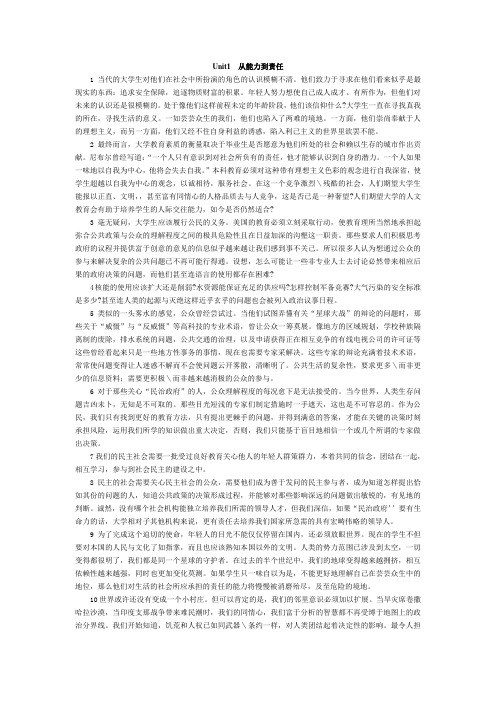
Unit1 从能力到责任1当代的大学生对他们在社会中所扮演的角色的认识模糊不清。
他们致力于寻求在他们看来似乎是最现实的东西:追求安全保障,追逐物质财富的积累。
年轻人努力想使自己成人成才、有所作为,但他们对未来的认识还是很模糊的。
处于像他们这样前程未定的年龄阶段,他们该信仰什么?大学生一直在寻找真我的所在,寻找生活的意义。
一如芸芸众生的我们,他们也陷入了两难的境地。
一方面,他们崇尚奉献于人的理想主义,而另一方面,他们又经不住自身利益的诱惑,陷入利己主义的世界里欲罢不能。
2最终而言,大学教育素质的衡量取决于毕业生是否愿意为他们所处的社会和赖以生存的城市作出贡献。
尼布尔曾经写道:“一个人只有意识到对社会所负有的责任,他才能够认识到自身的潜力。
一个人如果一味地以自我为中心,他将会失去自我。
”本科教育必须对这种带有理想主义色彩的观念进行自我深省,使学生超越以自我为中心的观念,以诚相待,服务社会。
在这一个竞争激烈\残酷的社会,人们期望大学生能报以正直、文明,,甚至富有同情心的人格品质去与人竞争,这是否已是一种奢望?人们期望大学的人文教育会有助于培养学生的人际交往能力,如今是否仍然适合?3毫无疑问,大学生应该履行公民的义务。
美国的教育必须立刻采取行动,使教育理所当然地承担起弥合公共政策与公众的理解程度之间的极具危险性且在日益加深的沟壑这一职责。
那些要求人们积极思考政府的议程并提供富于创意的意见的信息似乎越来越让我们感到事不关己。
所以很多人认为想通过公众的参与来解决复杂的公共问题已不再可能行得通。
设想,怎么可能让一些非专业人士去讨论必然带来相应后果的政府决策的问题,而他们甚至连语言的使用都存在困难?4核能的使用应该扩大还是削弱?水资源能保证充足的供应吗?怎样控制军备竞赛?大气污染的安全标准是多少?甚至连人类的起源与灭绝这样近乎玄乎的问题也会被列入政治议事日程。
5类似的一头雾水的感觉,公众曾经尝试过。
当他们试图弄懂有关“星球大战”的辩论的问题时,那些关于“威慑”与“反威慑”等高科技的专业术语,曾让公众一筹莫展。
现代大学英语精读第二版,unit12,Onwards and upwards,课文翻译,有删改且符合课文
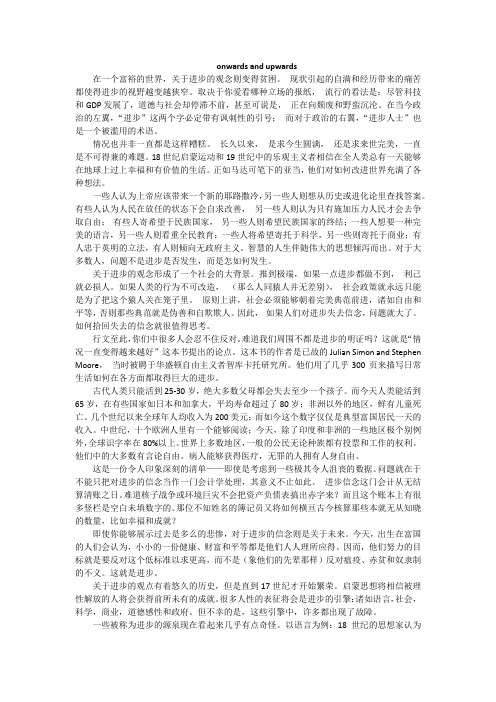
onwards and upwards在一个富裕的世界,关于进步的观念则变得贫困。
现状引起的自满和经历带来的痛苦都使得进步的视野越变越狭窄。
取决于你爱看哪种立场的报纸,流行的看法是:尽管科技和GDP发展了,道德与社会却停滞不前,甚至可说是,正在向颓废和野蛮沉沦。
在当今政治的左翼,“进步”这两个字必定带有讽刺性的引号;而对于政治的右翼,“进步人士”也是一个被滥用的术语。
情况也并非一直都是这样糟糕。
长久以来,是求今生圆满,还是求来世完美,一直是不可得兼的难题。
18世纪启蒙运动和19世纪中的乐观主义者相信在全人类总有一天能够在地球上过上幸福和有价值的生活。
正如马达可笔下的亚当,他们对如何改进世界充满了各种想法。
一些人认为上帝应该带来一个新的耶路撒冷,另一些人则想从历史或进化论里查找答案。
有些人认为人民在放任的状态下会自求改善,另一些人则认为只有施加压力人民才会去争取自由;有些人寄希望于民族国家,另一些人则希望民族国家的终结;一些人想要一种完美的语言,另一些人则看重全民教育;一些人将希望寄托于科学,另一些则寄托于商业;有人忠于英明的立法,有人则倾向无政府主义。
智慧的人生伴随伟大的思想倾泻而出。
对于大多数人,问题不是进步是否发生,而是怎如何发生。
关于进步的观念形成了一个社会的大背景。
推到极端,如果一点进步都做不到,利己就必损人。
如果人类的行为不可改造,(那么人同猿人并无差别),社会政策就永远只能是为了把这个猿人关在笼子里。
原则上讲,社会必须能够朝着完美典范前进,诸如自由和平等,否则那些典范就是伪善和自欺欺人。
因此,如果人们对进步失去信念,问题就大了。
如何拾回失去的信念就很值得思考。
行文至此,你们中很多人会忍不住反对。
难道我们周围不都是进步的明证吗?这就是“情况一直变得越来越好”这本书提出的论点。
这本书的作者是已故的Julian Simon and Stephen Moore,当时被聘于华盛顿自由主义者智库卡托研究所。
多维教程·熟谙_课文翻译(1-5)
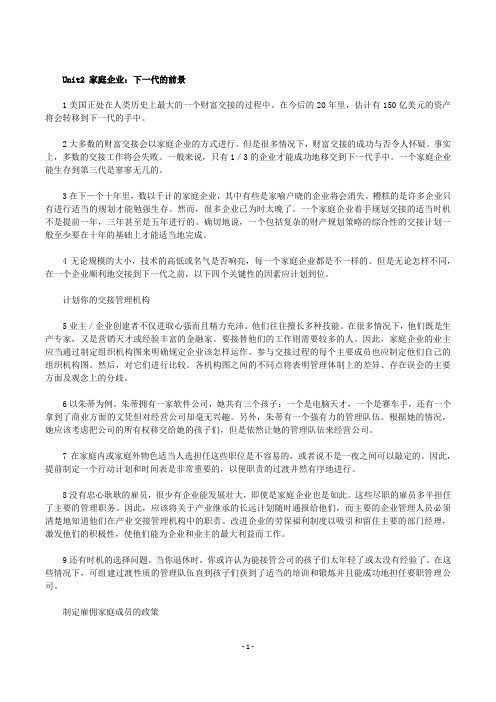
Unit2 家庭企业:下一代的前景1美国正处在人类历史上最大的一个财富交接的过程中。
在今后的20年里,估计有150亿美元的资产将会转移到下一代的手中。
2大多数的财富交接会以家庭企业的方式进行。
但是很多情况下,财富交接的成功与否令人怀疑。
事实上,多数的交接工作将会失败。
一般来说,只有1/3的企业才能成功地移交到下一代手中。
一个家庭企业能生存到第三代是寥寥无几的。
3在下—个十年里,数以千计的家庭企业,其中有些是家喻户晓的企业将会消失。
糟糕的是许多企业只有进行适当的规划才能勉强生存。
然而,很多企业已为时太晚了。
一个家庭企业着手规划交接的适当时机不是提前一年,三年甚至是五年进行的。
确切地说,一个包括复杂的财产规划策略的综合性的交接计划一般至少要在十年的基础上才能适当地完成。
4无论规模的大小,技术的高低或名气是否响亮,每一个家庭企业都是不一样的。
但是无论怎样不同,在一个企业顺利地交接到下一代之前,以下四个关键性的因素应计划到位。
计划你的交接管理机构5业主/企业创建者不仅进取心强而且精力充沛。
他们往往擅长多种技能。
在很多情况下,他们既是生产专家,又是营销天才或经验丰富的金融家。
要接替他们的工作则需要较多的人。
因此,家庭企业的业主应当通过制定组织机构图来明确规定企业该怎样运作。
参与交接过程的每个主要成员也应制定他们自己的组织机构图。
然后,对它们进行比较。
各机构图之间的不同点将表明管理体制上的差异、存在误会的主要方面及观念上的分歧。
6以朱蒂为例。
朱蒂拥有一家软件公司,她共有三个孩子:一个是电脑天才,一个是赛车手,还有一个拿到了商业方面的文凭但对经营公司却毫无兴趣。
另外,朱蒂有一个强有力的管理队伍。
根据她的情况,她应该考虑把公司的所有权移交给她的孩子们,但是依然让她的管理队伍来经营公司。
7在家庭内或家庭外物色适当人选担任这些职位是不容易的,或者说不是一夜之间可以敲定的。
因此,提前制定一个行动计划和时间表是非常重要的,以便职责的过渡井然有序地进行。
unit12课文翻译Microsoft Word 文档
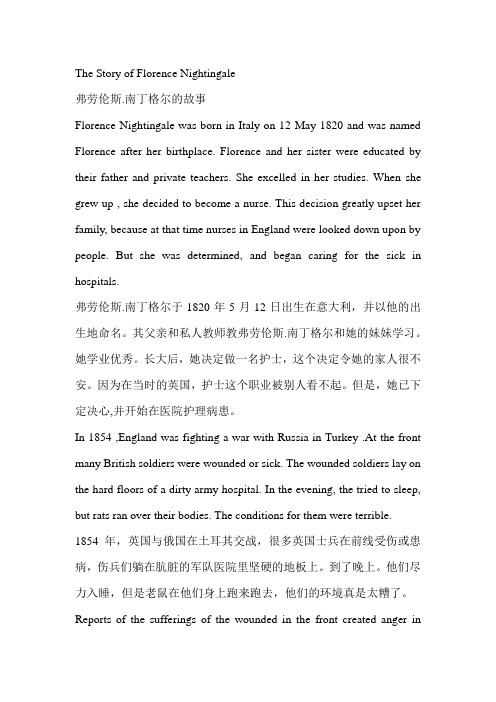
The Story of Florence Nightingale弗劳伦斯.南丁格尔的故事Florence Nightingale was born in Italy on 12 May 1820 and was named Florence after her birthplace. Florence and her sister were educated by their father and private teachers. She excelled in her studies. When she grew up , she decided to become a nurse. This decision greatly upset her family, because at that time nurses in England were looked down upon by people. But she was determined, and began caring for the sick in hospitals.弗劳伦斯.南丁格尔于1820年5月12日出生在意大利,并以他的出生地命名。
其父亲和私人教师教弗劳伦斯.南丁格尔和她的妹妹学习。
她学业优秀。
长大后,她决定做一名护士,这个决定令她的家人很不安。
因为在当时的英国,护士这个职业被别人看不起。
但是,她已下定决心,并开始在医院护理病患。
In 1854 ,England was fighting a war with Russia in Turkey .At the front many British soldiers were wounded or sick. The wounded soldiers lay on the hard floors of a dirty army hospital. In the evening, the tried to sleep, but rats ran over their bodies. The conditions for them were terrible. 1854年,英国与俄国在土耳其交战,很多英国士兵在前线受伤或患病,伤兵们躺在肮脏的军队医院里坚硬的地板上。
B1 Unit 12 Text 1 英汉对照(未找到中文翻译)
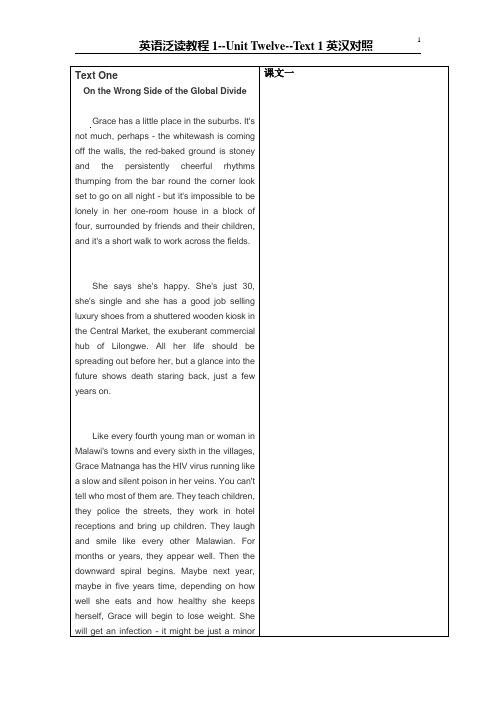
课文一Text OneOn the Wrong Side of the Global DivideGrace has a little place in the suburbs. It'snot much, perhaps - the whitewash is comingoff the walls, the red-baked ground is stoneyand the persistently cheerful rhythmsthumping from the bar round the corner lookset to go on all night - but it's impossible to belonely in her one-room house in a block offour, surrounded by friends and their children,and it's a short walk to work across the fields.She says she's happy. She's just 30,she's single and she has a good job sellingluxury shoes from a shuttered wooden kiosk inthe Central Market, the exuberant commercialhub of Lilongwe. All her life should bespreading out before her, but a glance into thefuture shows death staring back, just a fewyears on.Like every fourth young man or woman inMalawi's towns and every sixth in the villages,Grace Matnanga has the HIV virus running likea slow and silent poison in her veins. You can'ttell who most of them are. They teach children,they police the streets, they work in hotelreceptions and bring up children. They laughand smile like every other Malawian. Formonths or years, they appear well. Then thedownward spiral begins. Maybe next year,maybe in five years time, depending on howwell she eats and how healthy she keepsherself, Grace will begin to lose weight. Shewill get an infection - it might be just a minorone - but after that she will get another, more serious. It could be pneumonia, it could be TB or it could be meningitis. There are drugs in Malawi's hospitals to treat all three successfully, but each time she recovers, her immune system will be that little bit more battered, her weight lower and her chances of surviving diminished. The curves of healthy flesh will disappear. She will begin to look wasted and everybody she knows will understand why. Eventually her body will give up the fight, the pain and fever will engulf her and Grace will become just another Aids statistic.She doesn't think about it, she says, with a smile and a slight shrug, as she looks out of her kiosk at the vitality and the colour of the market, where brightly dressed women sit among their sacks of mint leaves, tomatoes and red aduki beans, tailors peddle sewing machines and heat flat irons on open fires to repair old clothes and everything from door handles to dried fish to pineapples is for sale. But she knows too well what is in store. Her freedom and independence were wished on her like a curse. Once she had a husband. Once she had a child. Both are dead."I was married for eight years," she says. "My husband passed away in 1998. He collapsed and was taken to the Central Hospital and put on oxygen." Like most of the young people who die, he had not been tested for HIV, but there's little doubt that Aids killed him.He survived longer than their little daughter. Tiyajane was born in 1993, the longed-for fulfilment of marrriage in Malawian society, where almost every young woman has a baby strapped to her back. Tiyajane appeared to be healthy at first, but then the weight gain slowed. She stopped thriving. She began to get sick. She picked up infections. When she died, aged three, she was a pitiful, wasted scrap, the ulcers in her throat and mouth making the pain of swallowing more vicious than the pangs of hunger.。
Unit12Lifeisfulloftheunexpected原文与翻译
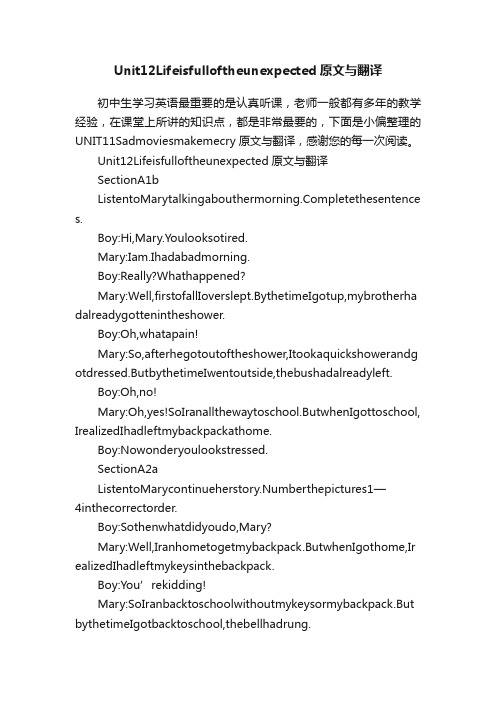
Unit12Lifeisfulloftheunexpected原文与翻译初中生学习英语最重要的是认真听课,老师一般都有多年的教学经验,在课堂上所讲的知识点,都是非常最要的,下面是小偏整理的UNIT11Sadmoviesmakemecry原文与翻译,感谢您的每一次阅读。
Unit12Lifeisfulloftheunexpected原文与翻译SectionA1bpletethesentence s.Boy:Hi,Mary.Youlooksotired.Mary:Iam.Ihadabadmorning.Boy:Really?Whathappened?Mary:Well,firstofallIoverslept.BythetimeIgotup,mybrotherha dalreadygottenintheshower.Boy:Oh,whatapain!Mary:So,afterhegotoutoftheshower,Itookaquickshowerandg otdressed.ButbythetimeIwentoutside,thebushadalreadyleft.Boy:Oh,no!Mary:Oh,yes!SoIranallthewaytoschool.ButwhenIgottoschool, IrealizedIhadleftmybackpackathome.Boy:Nowonderyoulookstressed.SectionA2aListentoMarycontinueherstory.Numberthepictures1—4inthecorrectorder.Boy:Sothenwhatdidyoudo,Mary?Mary:Well,Iranhometogetmybackpack.ButwhenIgothome,Ir ealizedIhadleftmykeysinthebackpack.Boy:You’rekidding!Mary:SoIranbacktoschoolwithoutmykeysormybackpack.But bythetimeIgotbacktoschool,thebellhadrung.Boy:Oh,no!Mary:AndbythetimeIwalkedintoclass,theteacherhadstartedt eachingalready.Sheaskedforourhomework,butofcourseIdidn’th aveit.SectionA2bFillintheblankswiththecorrectformsoftheverbsinbrackets.The nlistenagainandcheckyouranswers.Boy:Sothenwhatdidyoudo,Mary?Mary:Well,Iranhometogetmybackpack.ButwhenIgothome,Ir ealizedIhadleftmykeysinthebackpack.Boy:You’rekidding!Mary:SoIranbacktoschoolwithoutmykeysormybackpack.But bythetimeIgotbacktoschool,thebellhadrung.Boy:Oh,no!Mary:AndbythetimeIwalkedintoclass,theteacherhadstartedt eachingalready.Sheaskedforourhomework,butofcourseIdidn’th aveit.SectionA2dRoleplaytheconversation.Whywereyoulateforclasstoday,Kevin?Myalarmclockdidn'tgooff!Ikeptsleeping,andwhenIwokeitwas already8;00a.m.!Oh,no!SoIjustquicklyputonsomeclothesandrushedoutofthedoor.Youdidn'teatbreakfast?No,Ididn'tevenbrushmyteethorwashmyface.ButbeforeIgotot hebusstop,thebushadalreadyleft.Thenhowdidyougethere?Luckily,Carl'sdadsawmeonthestreetandgavemealiftinhiscar.Well,atleastbythetimeyougottoschool,youwereonlyfiveminuteslatefouclass.SectionA3aReadthepassageandanswerthequestions.LifeIsFulloftheUnexpectedInMay2001,IfoundajobinNewYorkattheWorldTradeCenter.On September11,2001,Iarrivedatmybuildingataround8:30a.m.Iwasa bouttogoupwhenIdecidedtogetacoffeefirst.Iwenttomyfavoriteco ffeeplaceeventhoughitwastwoblockseastfrommyoffice.AsIwaswaitinginlinewithotherofficeworkers,Iheardaloudsoun d.BeforeIcouldjointheothersoutsidetoseewhatwasgoingon,thefir stplanehadalreadyhitmyofficebuilding.Westaredindisbeliefatthe blacksmokerisingabovetheburningbuilding.Ifeltluckytobealive.Almost10yearslater,Iwokeupat10:00a.m.onFebruary21,2011a ndrealizedthatmyalarmneverwentoff.Ijumpedoutofbedandwents traighttotheairport.ButbythetimeIgottotheairport,myplanetoNe wZealandhadalreadytakenoff.“ThisisthefirstholidayI’vetakeninayear,andnowI’vemisse dmyplane.Whatbadluck!”Ithoughttomyself.Theotherplanesw er efullsoIhadtowaittillthenextday.Thenextmorning,Iheardaboutthe earthquakeinNewZealandthedaybefore.Mybadluckhadunexpect edlyturnedintoagoodthing.SectionB1cDave,NickandJoearetalkingaboutAprilFool’sDay.Listenand writeeachperson’snameunderthecorrectpicture.Ni ck:HassomeoneevertrickedyouonAprilFool’sDay,Dave?Dave:Yes.Afriendonceinvitedmetoacostumeparty.WhenIgott here,Ifoundthatitwasn’tacostumeparty.Iwastheonlypersonweari ngacostume,andIwasreallyembarrassed.Howaboutyou,Nick?Nick:Well,lastAprilFool’sDay,whenmyalar mwentoff,Igotup,t ookashower,gotdressed,andwenttoschool.ButwhenIgotthere,theschoolwasempty.Iwastheonlyonethere.Afteranhour,theotherkids showedup,andIrealizedthatmybrotherhadfooledme.Dave:Hehad?Nick:Uh-huh.Hehadchangedtheclocktoanhourearlier.Whataboutyou,Joe? WhathappenedtoyouonAprilFool’sDay?Joe:Well,myfriendcalledmeonMarch31stlastyearandtoldmew ehadamathtestthenextday.BythetimeIgottomathclass,Iwastiredb ecauseIhadstayedupallnightstudying.ThenIfoundoutthatmyfrien dhadfooledme.Wedidn’thaveatestatall!SectionB1dListenagain.Whosayseachofthephrasesbelow?WriteDforDav e,NforNickandJforJoe.Nick:HassomeoneevertrickedyouonAprilFool’sDay,Dave?Dave:Yes.Afriendonceinvitedmetoacostumeparty.WhenIgott here,Ifoundthatitwasn’tacostumeparty.Iwastheonlypersonweari ngacostume,andIwasreallyembarrassed.Howaboutyou,Nick?Nick:Well,lastAprilFool’sDay,whenmyalarmwentoff,Igotup,t ookashower,gotdressed,andwenttoschool.ButwhenIgotthere,the schoolwasempty.Iwastheonlyonethere.Afteranhour,theotherkids showedup,andIrealizedthatmybrotherhadfooledme.Dave:Hehad?Nick:Uh-huh.Hehadchangedtheclocktoanhourearlier.Whataboutyou,Joe? WhathappenedtoyouonAprilFool’sDay?Joe:Well,myfriendcalledmeonMarch31stlastyearandtoldmew ehadamathtestthenextday.BythetimeIgottomathclass,Iwastiredb ecauseIhadstayedupallnightstudying.ThenIfoundoutthatmyfrien dhadfooledme.Wedidn’thaveatestatall!SectionB2bReadthequickly.Thenmatcheachparagaphwiththemainidea.AprilFool’sDayisacelebrationthattakesplaceindifferentcoun triesaroundtheworld.IthappensonApril1steveryyearandisadaywh enmanypeopleplayallkindsoftricksandjokesoneachother.OneAprilFool’sDay,areporterinEnglandannouncedthatther ewouldbenomorespaghettibecausethespaghettifarmersinItalyha dstoppedgrowingspaghetti.Manypeoplerantotheirlocalsupermar ketstobuyasmuchspaghettiastheycould.Bythetimepeoplerealize dthatthestorywasahoax,allofthespaghettiacrossthecountryhadb eensoldout.InanotherfamoustrickaTVshowinEnglandreportedthediscove ryofspecialwater.Theysaidthiswaterwouldhelppeopleloseweighta ndthatonecustomerhadalreadylostalotofweightinjustfourmonths .Bytheendoftheday,morethan10,000peoplehadphonedtheTVstati ontofindouthowtogetthiswater.ManyAprilFool’sjokesmayendupbeingnotveryfunny.Afamo usTVstaronceinvitedhisgirlfriendontohisshowonAprilFool’sDay. Heaskedhertomarryhim.Theladywassohappybecauseshereallywa ntedtogetmarried.However,whenshesaidyes,hereplied,“AprilFoo l!”Thatlittlejokedidn’thaveaveryhappyending.TheTVstarlosthis girlfriendandhisshowwascanceled.Oneoftheworld’smostfamoustricks,however,happenedinOc toberratherthaninApril.Inthatmonthin1938,actorOrsonWellesann ouncedonhisradioprogramthataliensfromMarshadlandedonthee arth.Hedescribedwheretheyhadlandedandtoldhowtheyweremov ingacrosstheUnitedStates.Wellesmadeitsoundsorealthathundred sofpeoplebelievedthestory,andfearspreadacrossthewholecountr y.Bythetimepoliceofficersannouncedthatthestorywasahoax,thou sandsofpeoplehadlefttheirhomes.翻译:SectionA2d马特:凯文,你今天为什么上课迟到了?凯文:我的闹钟没有响!我一直睡觉,当我醒来时,已经是早上8点了!马特:哦,不!凯文:所以我迅速穿上衣服冲出家门。
多维阅读第12级—A Trip to Space Camp 太空训练营

Try to read aloud(Part 4) Training for Spinning in Space
PART 5 A SPACE MISSION
(P10-P11) 1. What do you think this boy is doing? 2. What does cockpit mean? What is it like? 3. How do you know there is a lot to do on a flight? Find out the words in the passage. 4. What qualities do you think make a good astronaut?
Discuss with your partner: What is the main idea of this book?
PART 1
WHAT IS SPACE CAMP?
(P2-P3) 1. What do you think the kids in the photo are doing? 2. What do you think a space camp is? 3. Would you like to go to a space camp? Why? 4. Why do you think the astronauts have to wear a
WHAT DO YOU LEARN FROM THIS BOOK?
K (What I Know)
W (What I Want to Know)
L (What I learned)
• Why does is the author write this book?
• Do you like to join in a camp like this? Why or why not?
- 1、下载文档前请自行甄别文档内容的完整性,平台不提供额外的编辑、内容补充、找答案等附加服务。
- 2、"仅部分预览"的文档,不可在线预览部分如存在完整性等问题,可反馈申请退款(可完整预览的文档不适用该条件!)。
- 3、如文档侵犯您的权益,请联系客服反馈,我们会尽快为您处理(人工客服工作时间:9:00-18:30)。
Unit 12 Foreword to New World Dictionaryof the American LanguageDavid B.GuralnikEditor in Chief1.The appearance of Webster's New World Dictionary of the American Language, College Edition, on the lexicographical scene in 1953 elicited, in the first major review of that work (Library Journal, May, 1953), the encomium "a great advance in American lexicography." In the years immediately following, others made their own assessment of that work, scholars, teachers, students, writers, and workers in every field of endeavor. Unanimity in assessing so complex an undertaking, and one so dependent upon subjective evaluation, is hardly to be expected, but the consensus, as evidenced by rapidly growing acceptance of the dictionary on college campuses and its regular appearance on the bookshelves and desks of researchers, professional persons, and the like, suggested substantial agreement with that first assessment.2.Efforts were continually made to maintain the currency of the dictionary through annual, later biennial, updating. These efforts were for a time successful, at least in incorporating the more visible of the newest accretions to the language into the written record of that language. Eventually, however, it became apparent that the flood of new terms inundating the staff's citation file, the subtle changes in pronunciation reflected in the aural citations, and the changes in group attitudes toward numerous locutions had made a total revision of the dictionary mandatory. The first decades of the second half of the 20th century have witnessed not only a population explosion, but an information' explosion of unprecedented proportions. Rapid advances in the physical sciences andin technology are bringing with them countless new terms and new applications of established terms. Vast sociological and political upheavals have had lexical consequences, and the young of our land, both alienated and unalienated, have made full, vigorous contribution to the slang sector of the language. Free borrowing from other languages, always a salient feature of English, continues unabated (see Dr. Umbach's article Etymology, on p. xxxi).3.The science of lexicography makes it possible for the dictionary staff of our times to keep up with these shifts and turns in language and to accumulate large stores of data with which to work. It is still, however, the art of the lexicographer that must be employed in sifting the masses of data, selecting those items and details that fall properly within the scope of the dictionary under construction, and assembling these into an instructive, useful, and graceful whole. Most often, a period of incubation is required for new words to prove their vitality and establish their right to entry in the dictionary. Sometimes, however, the swift current of events brings starling changes, and the items of vocabulary resulting from such events are firmly fixed in our speech from the day of their coinage. Not long before this work went to press, we witnessed a milestone in the human saga, man's first, halting steps on the moon's surface, an event that demanded the insertion of such an entry as mascon and a biographical listing Neil Armstrong, whose feat - and feet - made history.4.Those who are familiar with the first College Edition of Websters New World Dictionary will find here the same reassuringly large and clear type and the same single alphabetical listing that makes it unnecessary to leaf through numerous supplementary lists of biographical and geographical entries,proper names, and abbreviations. They will also find in this Second College Edition the same devotion to careful, detailed definitions as in the previous edition and the same generous use of illustrative examples to help clarify both meaning and usage. As they continue to use this new work, they will, however, discover many thousands of new entries and new meanings not to be found in the earlier edition, many of them, indeed, not to be found in any other dictionary. They will discover. too, small but significant changes in the diacritical key that lend phonemic precision to the pronunciations, and they will discover the changes that the record shows have taken place in the prevalence of certain pronunciations since the first edition. Such change is a phenomenon that always characterized living languages, and it is a special characteristic of the language of America.5.The users of this dictionary will find, again, that each entry block has been ordered to show logical semantic extension from the etymology through the earlier uses of the word to the current, often specialized or informal applications. The result is a single coherent paragraph that clearly shows the history and development of the word and the relationship among the meanings rather than an assemblage of fragmented bits of disconnected information. The etymologies, always a strong feature of the New World Dictionary, have been carefully reviewed by Dr. Umbach, who has incorporated the latest etymological findings and has still further extended the practice of showing cognate relationships between words in English and between English words and those in other Indo-European languages. For the first time in any dictionary of the language, the origins of American place names have been included, prepared by Dr. Mathews, where these could be ascertained. Also for the first time in any dictionary, every Americanism has been clearly identified as such (see the "Guide to the Use of the Dictionary," paragraph I., E. on p. ix and Dr. Mathews' article Americanisms on p. xxxiii).6. The art of the lexicographer is further displayed in the help that is given the user of the dictionary who must decide the aptness of any term or phrase to the use he wishes to make of it. The editors of this work believe that one who consults a college dictionary is entitled to the informed collective determination by the staff as to whether a particular term is appropriate to a standard or formal context or is suitable only in an informal context or as an item of slang; whether a given word is current, or obsolete, or archaic, or now rare; whether it is current only as a regional, or dialectal, term; and whether it is, in spite of widespread usage, held in low repute by those who take a stricter, or purist, view of these matters. The issue is not one on "permissiveness" versus "authoritarianism." No lexicographer, at least in this country, has been given a mandate either to permit or to disallow any usage. He has, however, assumed the responsibility of informing the public of the state of the language as of the time during which his dictionary was being compiled. The status of any usage, as determined by the trained lexicographer after a careful study of current writings and speech and disregarding the crotchets and prejudices of individuals, is a part of the record and should be incorporated among the data made available to the writer and the student.7.The absence from this dlctionary of a handful of old, well-known vulgate terms for sexual and excretory organs and functions is not due to a lack of citations for these words from current literature. On the contrary, the profusion of such citations in recent years would suggest that the terms in question are so well known as to require no explanation. The decision to eliminate them as part of extensive culling process that is the inevitable task of the lexicographer was made on the practical grounds that there is still objection in many quarters to the appearance of these terms in print and that to risk keeping this dictionary out of the hands of some students by introducing several terms that require little if any elucidation would be unwise. In a similar vein, it was decidedin the selection process that this dictionary could easily dispense with those true obscenities, the terms of racial or ethnic opprobrium, that are, in any case, encountered with diminishing frequency these days.8.The vocabulary entered was chosen to meet the needs of students and others in this particular period of history, and so it will be seen that there is here a heavier proportion of terms from the sciences than was true for previous edition. In response to numerous requests, it was decided to include the taxonomic designation, or scientific name, for every animal and plant entered. The taxa shown herein reflect the process of continuous adjustment and reclassification that is taking place in this discipline. In general, the technical definitions were written by, or prepared in direct consultation with, leading specialists in every field.9.Population figures for geographical entries and other similar statistical data have been checked with authoritative sources. Unofficial estimates have been avoided; only the latest official counts or estimates were considered reliable.10.On the editorial staff page preceding this foreword are listed the names of those wholaborad to produce the dictionary. Titular designations, however descriptive in intention, often fail to describe adequately the roles and responsibilities carried out. For example, Dr. Mitford M. Mathews, dean of American lexicographers and editor of the Dictionary of Americanisms, has over the past decade had a lively impact on nearly every aspect of this work to a degree improperly conveyed by the designation "Special Consulting Editor."11.A major advantage in the preparation of the second edition of a dictionary is the inevitable exposure to the collective wisdom of those who have put the first edition to the test of repeated usage. Over the years we have benefited immeasurably from the suggestions, queries, emendations, and citations offered by scholars, experts, and lay people throughout the United States and, indeed, throughout the world. However desirable, it would be impractical to attempt to acknowledge individually those many who have given us, and in many instances continue to give us, aid and advice. They will know who they are and, we trust, will accept our generalized thanks.12.Special acknowledgment must be made of those scholars who participated in the staff's planning sessions and whose good counsel has served us so well in the execution of those plans: Professor Charlton Laird (whose article Language and the Dictionary on p. xv you are urged to read), Professor Donald L1oyd, and the late Professor George Grauel. Our thanks are also herewith extended to the many individuals at institutions and agencies, private and governmental, who so graciously served as sources of information and verification, and to those persons who served as regular informants on matters of pronunciation and usage. Special thanks are due to the editors and custodians of the unpublished records of the Linguistic Atlas of the North-Central States for making those materials available to us, to Miss Dorothy Fey, of the United States Trademark Association, for her invaluable help in determining whether terms suspected of being trademarks do currently in fact have such status, and to Professor Frederick Mcleod for his expert assistance in the preparation of the supplementary "Guide to Punctuation, Mechanics, and Manuscript Form." For their helpful cooperation in solving a number of problems in typography, thanks are due to Mr. Donald M. Snyder and Mr. Willis Larson of the American Typesetting Company.13.The editors of Websters New World Dictionary of the American Language, Second College Edition, firmly believe that the years of work expended on its production will be justified by the many services it will perform for those who turn to it. To ensure that the greatest possible benefit is obtained from this reference work, the user is urged to read the "Guide to the Use of the Dictionary" on the following pages.。
